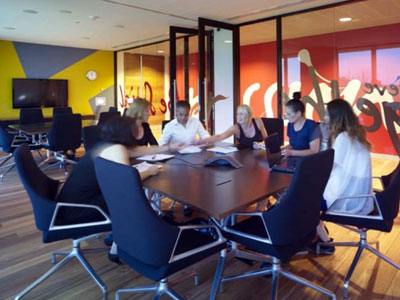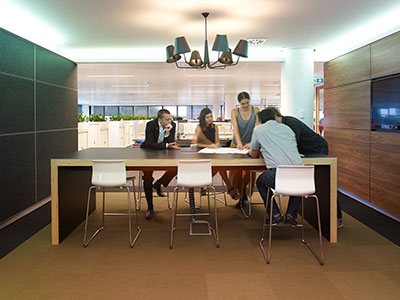Whether we’re in an economic boom or protracted bust; leading organisations expect the finest staff. They want the creative jump-starters who are natural collaborators, highly qualified and intrinsically motivated. Recent research has uncovered a surprising link between how employers prioritize their workplace – and the aspirations and results of the staff who work there.
Few companies would admit to skimping on leadership, integrity or teamwork. But equally few give priority to these values when it comes to creating a workplace that reflects them. By ‘workplace’ we at PCG mean the physical environment that supports the workplace dynamics of people, process and place.


As a CEO you know what you need to achieve and you know that whatever the economic climate you will need to do more with less, face ever greater competition, accomplish more in fewer hours to grow the business. This is the challenge facing most C-suite today.
Whether your focus is global, local or within an emerging market or product-led, it will be the strength and execution of your strategic plan that underpins that growth. Let’s face it, a vision without an execution plan is a purely a daydream. A strategic growth plan will be brought to life by a workplace which enables the focus of the strategy and the culture of the organisation.
An agile workplace means less space, greater collaboration and greater responsiveness to change. What we’re talking about is a workplace with built-in design efficiencies, scalability and robust technological platforms. A workplace that provides a solid backdrop to growth-led uncertainties and can adapt in any way you need to achieve the KPI’s of the organisation.
For the accomplished CFO the question is never “What might happen?” but, “Are we prepared for it?” Whereas a CFO used to base their strategic decisions on cost savings and value for money, this role now extends much further to consider limiting risk whilst still being profitable, the appropriate integration of technology, how to develop and drive a high performance culture, attracting and retaining talented employees and investment returns.
Investing in a strategic plan developed via careful assessment of the status quo and creation of actions to tackle these issues head on is what will carry organisations through even the most uncertain economic circumstances. An agile workplace means less space, greater collaboration,increased responsiveness to change and can be used to attract the staff you want. When a workplace has been sought out and designed with these strategies at the forefront, it not only impacts the bottom line of the financials, but supports them further as they strive to attain their organisational KPI’s.
Talent management is arguably the toughest challenge facing HR Directors today. Whilst more CEOs are relying on HR talent strategies as a means for growth than ever before; many remain unable to pursue market opportunities or have been forced to delay strategic initiatives because of talent challenges.
As such, one in three organisations in Australia is concerned that skills shortages will impact their company’s ability to innovate effectively. To combat this, CEO’s are reaching back into their organisation to ‘grow their own’ and close the skills gap internally with engaged and aspirational people.
The truth is, inspired workplaces need not come with a huge budget. If the goal is to change attitudes, shape culture, reinforce the brand and unite the team, this can be achieved through making sure your workplace genuinely reflects and enables the desired attitude.
As corporate leaders come to understand the critical contribution supply chain operations make to a company’s success, logistics is an increasingly frequent topic of boardroom discussions – and it is becoming common to find executives with supply chain or logistics expertise at the Board table.
When it comes to designing an optimized supply chain network, there are no cookie-cutter solutions. Every business has a unique set of requirements and those requirements are very dynamic. Every decision in this process will impact your services, profitability and business potential. To ensure an optimal design, it is critical that key business data from your information systems and your intangible business insights are accounted for and considered.
PCG has a track record of working in a strategic manner with Boards and management teams to unlock shareholder value and improve service delivery levels to our client’s customers.
Level 11,
3 Spring Street
Sydney NSW 2000
Phone: +61 2 8249 7500
Level 5,
365 Little Collins Street
Melbourne VIC 3000
Phone: +61 3 9600 4700
Suite 5, Level 7
10 Eagle Street
Brisbane QLD 4000
Phone: +61 7 3229 2900